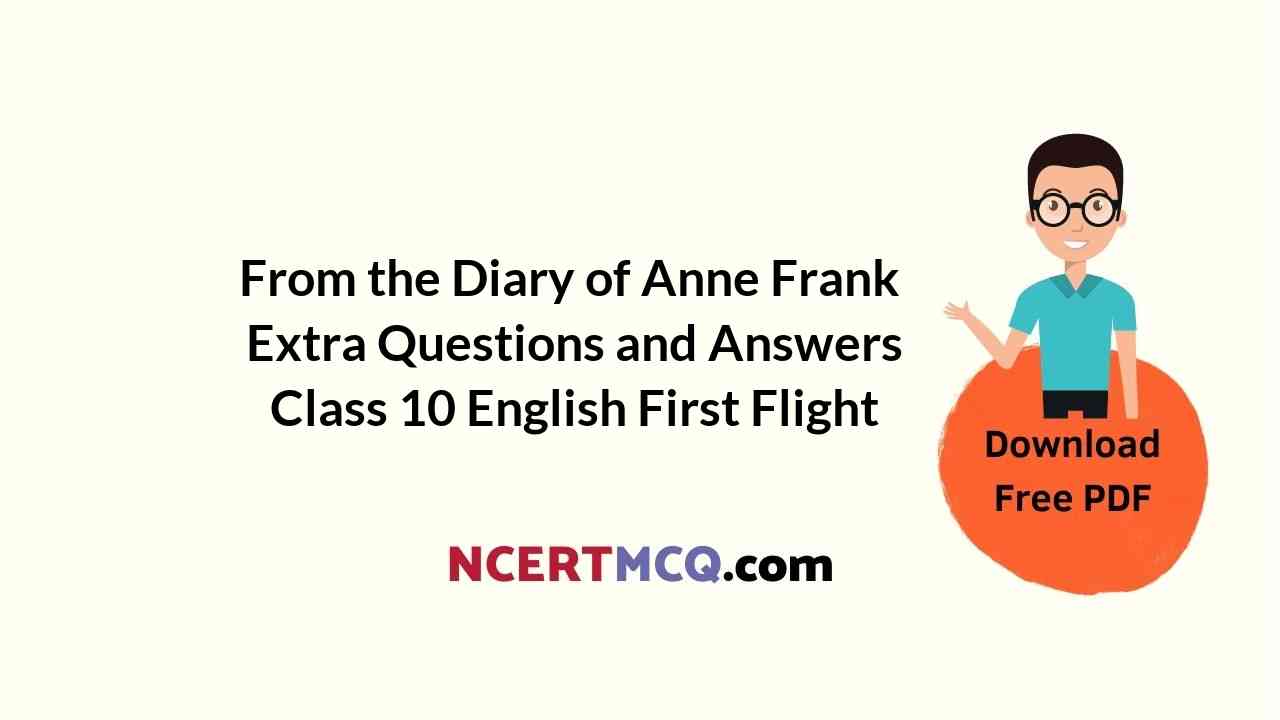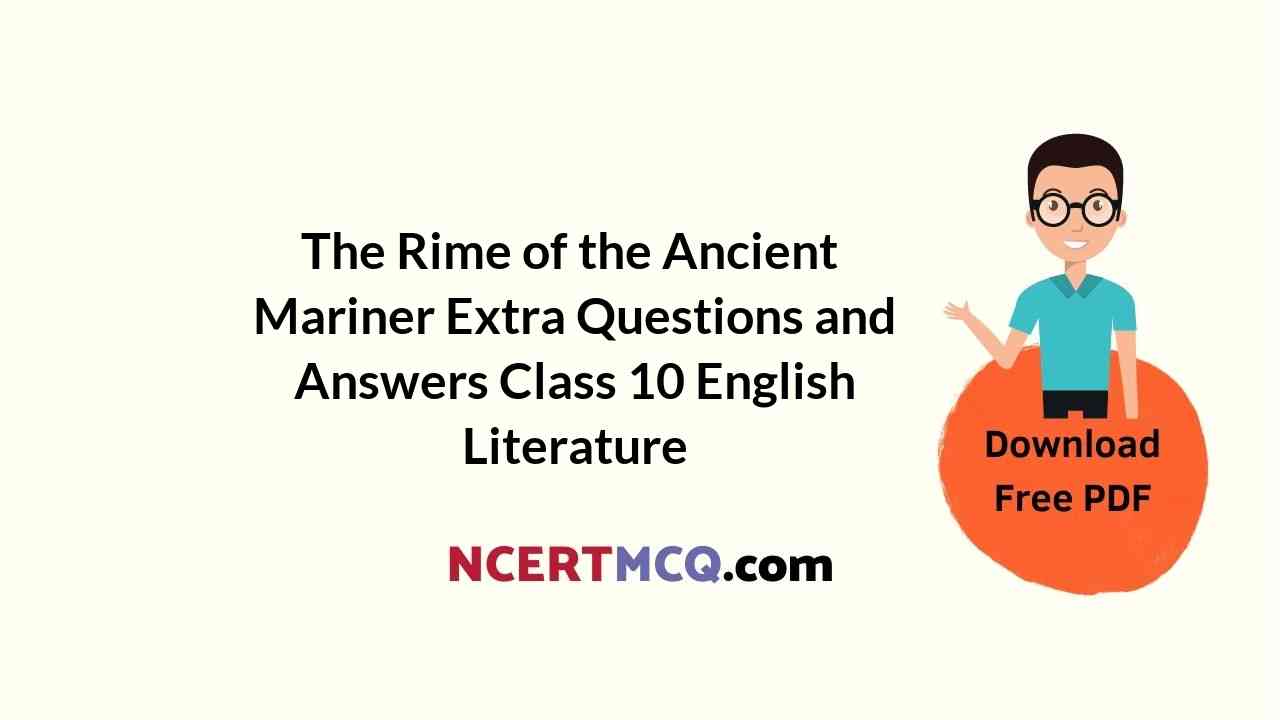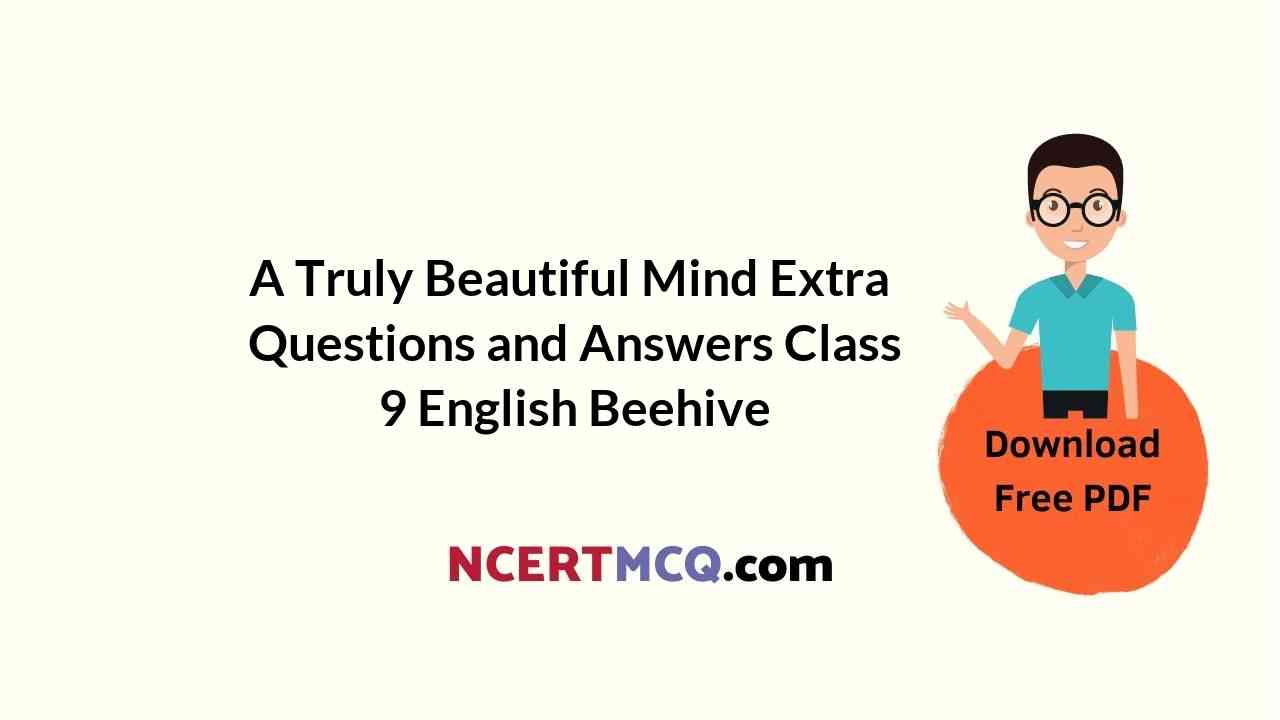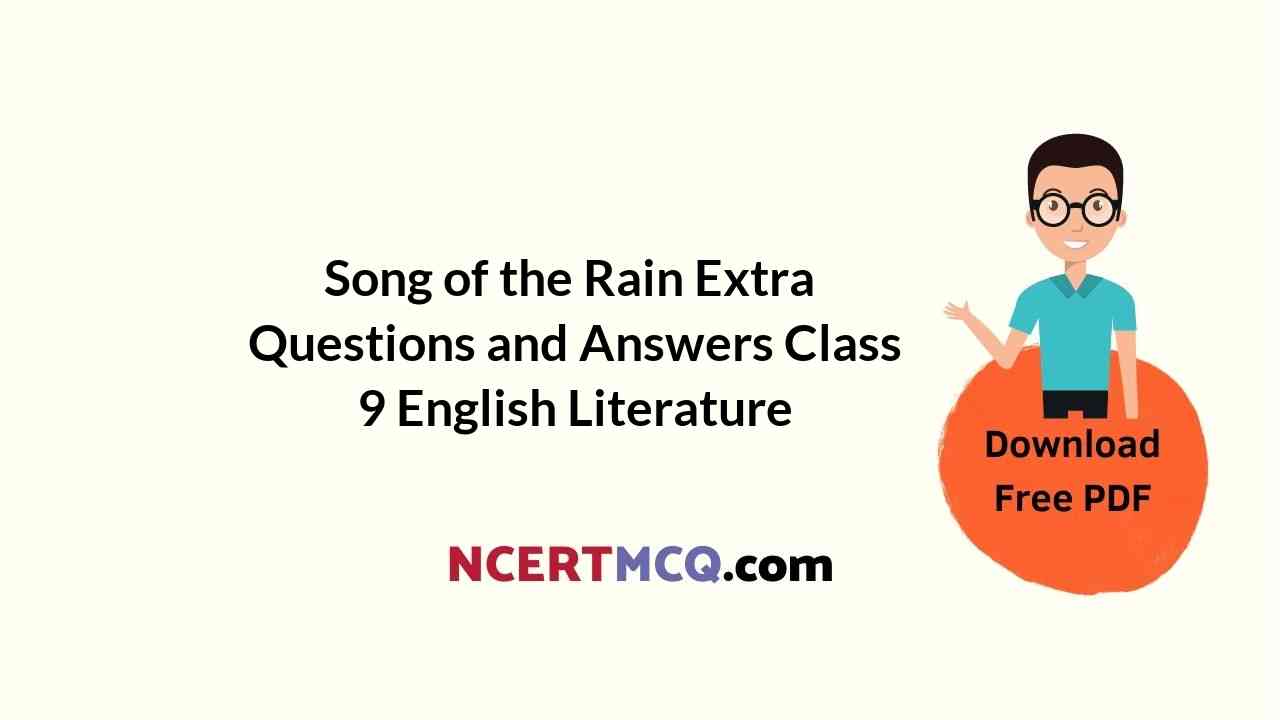Here we are providing From the Diary of Anne Frank Extra Questions and Answers Class 10 English First Flight, Extra Questions for Class 10 English was designed by subject expert teachers. https://ncertmcq.com/extra-questions-for-class-10-english/
From the Diary of Anne Frank Extra Questions and Answers Class 10 English First Flight
From the Diary of Anne Frank Extra Questions and Answers Very Short Answer Type
From The Diary Of Anne Frank Class 10 Extra Questions Question 1.
What name was given by Anne to her friend?
Answer:
‘Kitty’
From The Diary Of Anne Frank Extra Questions And Answers Question 2.
Why did Anne want to write a diary?
Answer:
Anne wanted to write a diary because she was devoid of a single friend.
From The Diary Of Anne Frank Extra Questions Question 3.
When the little girl started her diary, what was her age?
Answer:
Anne was thirteen years old, when she started her diary.
Anne Frank Extra Questions Question 4.
What did Anne say about her family?
Answer:
Anne said that she had loving parents, a sixteen year old sister, and about thirty people as her friends.
Anne Frank Class 10 Extra Questions Question 5.
Why did Anne stay with her grandmother?
Answer:
Anne had to stay with her grandmother since her parents had gone to Holland.
From The Diary Of Anne Frank Class 10 Extra Question Answer Question 6.
How many sisters Anne had?
Answer:
Anne had a sister named Margot.
Diary Of Anne Frank Class 10 Extra Questions Question 7.
What happened to the grandmother of Anne?
Answer:
The grandmother became ill in the summer of 1941.
Extra Questions From The Diary Of Anne Frank Question 8.
Why was the whole class feeling nervous?
Answer:
The whole class was feeling nervous about their result.
Extra Questions Of From The Diary Of Anne Frank Question 9.
What had some of the students done?
Answer:
Some of the students had staked their savings in the bet.
From The Diary Of Anne Frank Short Question Answer Question 10.
Why was Anne most worried?
Answer:
Anne was most worried about her maths result.
The Diary Of Anne Frank Class 10 Extra Questions Question 11.
What did Anne think of her father?
Answer:
Anne thought that her father was the most adorable person.
Diary Of Anne Frank Extra Questions Question 12.
When did Anne’s father marry?
Answer:
Anne’s father married when he was thirty six years hid.
From The Diary Of Anne Frank Class 10 Short Questions Question 13.
What was the name of Anne’s mother?
Answer:
Edith Hollander Frank.
From The Diary Of Anne Frank Important Questions Question 14.
When did Anne’s father emigrate to Holland?
Answer:
1933.
From The Diary Of Anne Frank Class 10 Important Questions Question 15.
Why did the maths teacher punish Anne?
Answer:
The maths teacher punished Anne for her talkative nature.
The Diary Of Anne Frank Extra Questions Question 16.
What idea do you form of Mr Keesing?
Answer:
Mr Keesing was a hard and strict person.
Question 17.
How did Sanne help Anne?
Answer:
Sanne wrote a long poem for Anne.
Question 18.
What did Anne feel about paper?
Answer:
Anne thought that paper had more patience than people.
Question 19.
What were Anne’s views about teachers?
Answer:
Anne’s views about teachers were that they were the most unpredictable creatures on the earth.
Question 20.
What was the punishment for Anne’s talkative nature?
Answer:
To write an essay on ‘A Chatterbox’.
From the Diary of Anne Frank Extra Questions and Answers Short Answer Type
Question 1.
In what way did Anne’s diary become the most widely read books?
Answer:
The diary of Anne provides a close examination of her daily life. Her original work was in Dutch language. Then there came several films, television and theatrical production of her diary.
Question 2.
Why did Anne feel like writing?
Answer:
Anne had no real friend. Even she had a greater need to get all kinds of things off her chest. So she felt like writing. Though she had a whim that none would take interest in her views because of her small age.
Question 3.
Anne was not alone in this world. How?
Answer:
Anne was not alone in this world. She had loving parents and a sixteen year old sister. She had a deep intimacy with thirty people. She could call them friends. She had a family, loving aunts and a sweet home.
Question 4.
What did Anne think of having a true friend?
Answer:
Anne thought that one could have good time with a true friend. Friendship brings closeness and helps in confiding in each other. Though we can talk about ordinary things with anybody else too.
Question 5.
What did Anne tell about her father?
Answer:
Anne said that her father was the most adorable man. He married at the age of thirty six and her mother was twenty five.
Question 6.
What shows that Anne was deeply in love with her grandmother?
Answer:
Anne loved her grandmother from the core of her heart. She died in January 1942, but Anne still went on loving her. When the birthday of Anne was being celebrated in 1942, a special candle was lit for her.
Question 7.
Why was Anne’s entire class quacking in the boots?
Answer:
Anne’s entire class was shaking with fear and nervousness because of the forthcoming teacher’s meeting. The teachers had to decide who would move up to the next grade and who would be kept back or not promoted.
Question 8.
Why was Anne in tears when she left the Montessori school?
Answer:
Anne studied at the Montessary school. She stayed there till she was in the sixth form. She was very much attached to her teacher and headmistress Mrs Kuperus. At the end of the year they were both in tears as they bid ‘a heartbreaking farewell’.
Question 9.
Where did Anne stay before going to Holland?
Answer:
Anne’s father emigrated to Holland in 1933 and her mother went with him in September. Anne and her sister did not go with their parents. They were sent to Aachen to stay with their grandmother.
Question 10.
Why did Anne feet alone?
Answer:
Anne felt alone though she had loving parents, relatives and thirty friends. It was because she could not confide in them. Though she enjoyed their company, yet she could not get close to any one of them.
Question 11.
How did Mr Keesing stop punishing her?
Answer:
Mr Keesing read the poem by Anne. In this poem, a father swan bit his three ducklings to death. He could not bear their excessive quacking. Mr Keesing took the jokes. He read the poem to the class. He never punished her after that.
Question 12.
Why did Anne jump with joy?
Answer:
Anne had already written two essays as punishment. She had exhausted all her views about chatterboxes. When she got a third essay to write, she was at a loss. She wanted something original. Her friend Sanne offered to write it in verse. Anne jumped with joy.
Question 13.
What arguments did Mr Keesing laugh at?
Answer:
The arguments that talking was a student’s trait and she could not do much about it since she had inherited it from her mother.
Question 14.
What punishment was given to Anne?
Answer:
Anne was a talkative girl. Her maths teacher was annoyed at her talkative nature. So he gave her an essay “A Chatterbox’ to write as a punishment.
Question 15.
What makes writing in a diary a strange experience for Anne Frank?
Answer:
Writing in a diary is a strange experience for Anne. It is because she has never written anything earlier. Also she thinks that none will take interest in the musings of a thirteen year old school girl.
Question 16.
Why does Anne want to keep a diary?
Answer:
Anne has got no friend with whom she can confide in (her secrets) and pass time. She feels herself alone in this world.
Question 17.
Why did Anne think she could confide more in her diary than in people?
Answer:
It is because of the fact that she can have a good time with her diary. She may be able to confide more with her diary by remaining quite close with it. She can even have heart to heart talk with her.
Question 18.
Why does Anne provide a brief sketch of her life?
Answer:
Anne has named her diary ‘Kitty’. She is her friend now. She will address and talk to her throughout. No one would understand her directly if she fails to give her brief sketch to the people.
Question 19.
What tells you that Anne loved her grandmother?
Answer:
When the parents of Anne went to Holland, she and her elder sister, Margot went to stay with their grandmother. She loved her very much. She was thinking of her. On Anne’s birthday, a special candle I for the grandma was also lit.
Question 20.
Why was Mr Keesing annoyed with Anne? What did he ask her to do?
OR
Why was Mr Keesing annoyed with Anne and what extra homework did he give to her after several warnings?
Answer:
Mr Keesing was her maths teacher. By nature Anne was very talkative. He did not like this. As a I punishment he gave an essay to write on the topic “A chatterbox” to Anne.
Question 21.
How did Anne justify her being a chatterbox in her essay?
Answer:
Anne was an intelligent girl. She explained in writing the necessity of talking. She argued that talking ^ is a student’s trait. She tried to control it but she was helpless since her mother was more talkative than her. It was her inherited trait.
Question 22.
Do you think Mr Keesing was a strict teacher?
Answer:
In the beginning Mr Keesing seems to be a hard task master. He wants to ridicule Anne but he himself becomes the victim. Since then he starts participating in jokes with the students.
Question 23.
What made Mr Keesing allow Anne to talk in-class?
Answer:
Mr Keesing thrice gave Anne a writing job on her talkative nature. On all the three occasions she came out successful. In the third attempt the ball fell on the teacher and he became her victim. Finding himself unsuccessful, he allowed Anne to talk in the class.
From the Diary of Anne Frank Extra Questions and Answers Long Answer Type
Question 1.
What punishment did Mr Keesing give to Anne Frank? How did she finally stop him from punishing?
Answer:
Mr Keesing was an old-fashioned maths teacher. Anne talked too much during Mr Keesing’s class and this annoyed him. He gave her several warnings but that did not keep Anne away, from talking in the class. So Mr Keesing had to punish her time and again.Mr Keesing assigned her some extra homework as a punishment for talking in the class.
He asked her to write an essay on the subject ‘A Chatterbox’. On the second occasion, she was asked to write an essay, on the subject ‘An Incorrigible Chatterbox’. On the third occasion, Mr Keesing assigned her a more difficult topic. It was “Quack, Quack, Quack, Said Mistress Chatterbox”.
Mr Keesing was trying to play a joke on her when he asked her to write an essay entitled “Quack, Quack, Quack, Said Mistress Chatterbox” so she decided to play a joke on Mr Keesing himself. She had nearly exhausted her ingenuity on the topic of chatterboxes. Her friend Sanne suggested her to write the essay in a poetic form.
She wrote about a mother duck and a father swan with three baby ducklings who were bitten to death by father because they quacked too much. Mr Keesing took the poem in the right way and understood the joke. After that he never assigned any extra homework to Anne for talking in the class. On the contrary, he was always making jokes in the class.
Question 2.
What do you know about Mr Keesing? How did he punish Anne?
Answer:
Mr Keesing was an old-fashioned maths teacher. Anne talked too much during Mr Keesing’s class and this annoyed him. He gave her several warnings but that did not keep Anne away, from talking in the class. So Mr Keesing had to punish her time and again.Mr Keesing assigned her some extra homework as a punishment for talking in the class.
He asked her to write an essay on the subject ‘A Chatterbox’. On the second occasion, she was asked to write an essay, on the subject ‘An Incorrigible Chatterbox’. On the third occasion, Mr Keesing assigned her a more difficult topic. It was “Quack, Quack, Quack, Said Mistress Chatterbox”.
Mr Keesing was trying to play a joke on her when he asked her to write an essay entitled “Quack, Quack, Quack, Said Mistress Chatterbox” so she decided to play a joke on Mr Keesing himself. She had nearly exhausted her ingenuity on the topic of chatterboxes. Her friend Sanne suggested her to write the essay in a poetic form.
She wrote about a mother duck and a father swan with three baby ducklings who were bitten to death by father because they quacked too much. Mr Keesing took the poem in the right way and understood the joke. After that he never assigned any extra homework to Anne for talking in the class. On the contrary, he was always making jokes in the class.
Question 3.
Why was Anne’s teacher annoyed with her? How was she able to bring about a change in his attitude towards her?
Answer:
Mr. Keesing, her maths teacher, was annoyed with Anne because she talked too much. When she did not improve, despite several warnings, he punished her. The punishment was extra homework. She was supposed to write an essay on “A Chatterbox”, then an essay on “An Incorrigible Chatterbox” and finally “Quack, Quack, Quack, Said Mistress Chatterbox”.
In her first essay Anne argued that talking was a student’s trait and her mother talked too much. She could not do anything with an inherited trait. Finally, Anne wrote the third essay in verse form. After reading the poem Mr Keesing read it to the class. It was about three ducklings bitten to death by their father swan because they quacked too much. After that Mr Keesing never gave her any punishment.
Question 4.
Write the character sketch of Anne Frank.
OR
How do you assess Anne’s character?
Answer:
Anne was a sensible, 13 year old girl. Though she had loving parents and thirty friends, she was lonely. She could not share her innermost thoughts and feelings with her friends. She knew that no one would understand her need to keep a diary. Anne was very caring and loving. She adored her father. She loved her grandma and often thought of her after her death. She was quite mature for her age, for she knew that no one would have time for the thoughts of a 13-years old. It was because of this maturity that she could not confide in her friends.
She was very talkative and was often punished by her maths teacher. Yet she was intelligent and had a good sense of humour. She convinced her teacher with her arguments, ultimately, he took the joke and did not punish her any more.
Question 5.
Was Anne an intelligent girl? Give instances in support of your answer.
Answer:
I think Anne was not only an intelligent girl, but she was far mature than her age. The very fact that
she thought so much that she needed to write a diary shows that she was intelligent. Anne was also intelligent enough to realise that no one would be interested in her musings. Anne believed that paper had more patience than people. She knew that she had friends with whom she could enjoy.
Yet, she could not confide in them. She realised that things would not change. She was quite a popular student. She knew that she would be promoted though Maths was her weak point. She also took her punishment of writing essays good humouredly. Ultimately she convinced Mr Keesing with her arguments and she got rid of her punishments.
Question 6.
“Paper has more patience than people’. Do you agree with the statement?
OR
Paper has more patience than people’. Explain with reference to “From the Diary of Anne Frank”.
Answer:
Anne Frank thought of a saying ‘Paper has more patience than people’. It requires a lot of patience to listen to someone’s private feelings and problems. It is not the listening that is important but the more important thing is to keep another’s secrets to oneself. It is a human tendency that after knowing someone’s’secrets, we pass them over to others. There is limit for listening to someone’s problems.
After some time, one is fed up with the person and tries to avoid him. But paper is a lifeless thing. It is never fed up with one’s problems. One can confide as much as one likes on a paper. Paper never becomes impatient. One can write on it as much as one desires and for as long as one wants to. As long as anyone else does not read it, the secret remains a secret.
Question 7.
“Our entire class is quacking in its boots”. Explain with reference to “From the Diary of Anne Frank”.
Answer:
Anne Frank was sent to Montessori nursery school. There she stayed till the sixth form. Her teacher Mrs. Kuperus was the headmistress. At the end of the year, the farewell function was arranged. It was a tearful farewell with the headmistress. Then Anne was admitted in a school. There were nine teachers. Among them two were females and rest were the male teachers.
The meeting was going on among the teachers. They had to decide who would be moved up to the next form and who would be kept back. This was a movement of nervousness for the entire class. They were uncertain for their fate. Even some of the students had staked their savings in bets. There were some of the dummies who could be kept back. All the students were confused about themselves. Even Anne was not sure due to mathematics. So the entire class was quacking in its boots.
Question 8.
“From the Diary of Anne Frank” throws light on teacher-student relationship, class atmosphere and discipline. Discuss.
OR
Write a paragraph on, the values of these aspects of school and how far these values are necessary for learning and life.
Answer:
From the Diary of Anne Frank’ describes the teacher-student relationship, class atmosphere and discipline. Anne Frank who talks a lot in the class gets punished by Mr Keesing, her maths teacher. He asks her to write essays as punishment is learning in disguise because he wanted her to focus on studies. He cannot be blamed for the punishment as he did it for the development of Anne.
The teacher student relationship is very respectful and sacred. It is about discipline and classroom manners which is essential for every student as well as teacher, otherwise both teaching or learning could hamper. This relationship is clearly shown in Mr Keesing and Anne Frank actions as they both try to joke with each other but in very humorous and healthy manner. So this healthy relationship is needed everywhere in the class for effective teaching and learning.
Question 9.
“I hope I will be able to confide everything to you, as I have never been able to confide in anyone, and I hope you will be a great source of comfort and support.” Explain.
Answer:
Anne writes this on the inside cover of her diary just after she receives it for her thirteenth birthday. At the time, she feels that she does not have any true confidants, which makes her feel lonely and misunderstood. Anne does, however, have many friends and admirers, and she is a playful, amusing, and social young girl. Thus, her sentiments in this passage may seem odd and a bit exaggerated,but she later explains that even though she has friends, she is never fully able to open up to them.
Anne finds that she and her friends talk only about trivial things, even when she has deeper things on her mind that she wishes to share. For example, she never broaches the subjects of her developing body or Germany’s occupation of Holland. Having a diary—which she addresses as “Kitty,” like a friend— enables her to express her thoughts without fear of being criticized by others. Anne’s relationship with her diary helps in comforting her through her insecure, lonely, and fearful time in the hiding.
Question 10.
Was Anne right when she said that the world would not be interested in the musings of a , thirteen year old girl?
Answer:
Anne was not at all right in having such a view about her musings. Her writings were translated in different languages under the title “The Diary of a Young Girl”. Her work became one of the world’s most widely read books. They are available in films.
Question 11.
There are some examples of diary or journal entries in the ‘Before You Read’ section. Compare these with what Anne writes in her diary. What language was the diary originally written in? In what way is Anne’s diary different?
Answer:
If we compare them with the diary of Anne, we get a difference. Anne gives minute details of all actions and feelings. The diary is written in Dutch language. Anne’s diary is different because she calls her diary her friend. All writings are referred to her friend ‘Kitty’, the name given to her diary.
Question 12.
Why does Anne need to give a brief sketch about her family? Does she treat ‘Kitty’ as an insider or an outsider?
Answer:
Anne says that none will understand a word of her stories in case she starts writing directly in ‘Kitty’ since she is her friend in the shape of a diary. She is a non-living organism. So she gives a brief description of her family. Anne does not think her diary as an outsider. She is an insider to her.
Question 13.
How does Anne feel about her father, her grandmother, Mrs Kuperus and Mr Keesing? What do these tell you about her?
Answer:
For Anne, her father is the most adorable man. Her grandmother is very lovely for her. She is very much attached with Mrs Kuperus and her farewell is full of tears. Mr Keesing is a hard task master. Her father has a high affection for Anne. The grandmother loves her much. The headmistress has good relations with Anne. Keesing calls her talkative.
Question 14.
What does Anne write in her first essay?
Answer:
Anne writes her first essay on ‘A Chatterbox’. She states that talking is a trait of students. She tries to control but she has inherited this trait from her mother. She is more talkative then Anne.
Question 15.
Anne says teachers are most unpredictable. Is Mr Keesing unpredictable? How?
Answer:
Anne is right in saying that most of the teachers are unpredictable. Mr Keesing is quite like this. None can tell about him. It is he who assigns different topics to Anne about which none can even think of. About the result the teachers have their own whims.
Question 7.
What do these statements tell you about Anne Frank as a person?
(i) We don’t seem to be able to get any closer, and that’s the problem. May be it’s my fault that we don’t confide in each other.
(ii) I don’t want to jot down the facts in this diary the way most people would, but I want the diary to be my friend.
(iii) Margot went to Holland in December, and I followed in February when I was plunked down on the table as a birthday present for Margot.
(iv) If you ask me, there are so many dummies that about a quarter of the class should be kept back, but teachers are the most unpredictable creatures on earth.
(v) Anyone could ramble on and leave big spaces between the words, but the trick was to come up with convincing arguments to prove the necessity of talking.
Answer:
To Anne as a person these statements have different meanings. The first statement speaks the importance of having the need of a real friend. The second statement speaks of Anne’s conviction of considering the diary as her real friend. The third statement shows her profound love* for her elder sister. About teacher she forms an opinion that they are unpredictable. The last statement points out her skill in writing an essay. Thus Anne was a skilled girl having the decent qualities of mind, body and soul.
From the Diary of Anne Frank Extra Questions and Answers Reference to Context
Read the following passages and answer the questions that follow:
Question 1.
Writing in a diary is a really strange experience for someone like me. Not only because I’ve never written anything before, but also because it seems to me that later on neither I nor anyone else will be interested in the musings of a thirteen-year-old school girl. Oh well, it doesn’t matter. I feel like writing, and I have an even greater need to get all kinds of things off my chest.
(i) Who is T in the passage?
(ii) Has she written something before?
(ii) Why does she think that no one will be interested in her musings? ,
(iv) Pick out the word from the passage which means the same as ‘thoughts’:
Answer:
(i) T in the passage is Anne Frank.
(ii) No, she has not written anything before.
(iii) She thinks that no one will be interested in her musings because she is just a thirteen year old school girl.
(iv) Musings.
Question 2.
‘Paper has more patience than people.’ I thought of this saying on one of those days when I was feeling a little depressed and was sitting at home with my chin in my hands, bored and listless, wondering whether to stay in or go out. I finally stayed where I was, brooding: Yes, paper does have more patience, and since I’m not planning to let anyone else read this stiff-backed notebook grandly referred to as a ‘diary’, unless I should ever find a real friend, it probably won’t make a bit of difference. Now I’m back to the point that prompted me to keep a diary in the first place: I don’t have a friend.
(i) Who has more patience than people according to Anne Frank?
(ii) What was her plan about her diary?
(iii) What prompted her to keep a diary?
(iv) Pick out the word from the passage which means the same as ‘low in spirit’
Answer:
(i) According to Anne Frank paper has more patience than people.
(ii) She planned that she would not let anyone else read that diary unless she got a real friend.
(iii) She did not have any friend that prompted her to keep a diary.
(iv) Depressed.
Question 3.
Let me put it more clearly, since no one will believe that a thirteen-year-old girl is completely alone in the world. And I’m not. I have loving parents and a sixteen-year-old sister, and there are about thirty people I can call friends. I have a family, loving aunts and a good home. No, on the surface I seem to have everything, except my one true friend. All I think about when I’m with friends is having a good time. I can’t bring myself to talk about anything but ordinary everyday things. We don’t seem to be able to get any closer, and that’s the problem. Maybe it’s my fault that we don’t confide in each other. In any case, that’s just how things are, and unfortunately they’re not liable to change. This is why I’ve started the diary.
(i) What did she want to clear?
(ii) Who were there in her family?
(iii) What was the problem?
(iv) Pick out the word from the passage which means the same as ‘bound to do something’.
Answer:
(i) She wanted to clear that she was not completely alone.
(ii) She had loving parents and a sixteen year old sister.
(iii) The problem was that she could not confide in her friends.
(iv) Liable.
Question 4.
To enhance the image of this long-awaited friend in my imagination, I don’t want to jot down the facts in this diary the way most people would do, but I want the diary to be my friend, and I’m going to call this friend ‘Kitty’. Since no one would understand a word of my stories to Kitty if I were to plunge right in, I’d better provide a brief sketch of my life, much as I dislike doing so.
(i) Who is T in the above passage?
(ii) What do most people write in their diary?
(iii) Who is ‘Kitty’?
(iv) Pick out the word from the passage which means the same as (i) ‘write down’, (ii) ‘to begin immediately’.
Answer:
(i) Anne Frank is ‘I’ in the passage.
(ii) Most people write facts in their diary.
(iii) ‘Kitty1 is the name of the diary of Anne Frank
(iv) jot down, plunge.
Question 5.
My father, the most adorable father I’ve ever seen, didn’t marry my mother until he was thirty-six and she was twenty-five. My sister, Margot, was born in Frankfurt in Germany in 1926. I was born on 12 June 1929. I lived in Frankfurt until I was four. My father emigrated to Holland in 1933. My mother, Edith Hollander Frank, went with him to Holland in September, while Margot and I were sent to Aachen to stay with our grandmother. Margot went to Holland in September, and I followed in February, when I was plunked down on the table as a birthday present for Margot.
(i) How old were her parents when they got married?
(ii) When and where was Margot born?
(iii) Where did she live until she was four?
(iv) Pick out a word from the passage which means same as ‘sat down hurriedly’.
Answer:
(i) Her father was thirty six and mother was twenty five year old when they got married.
(ii) Margot was born in Frankfurt in Germany in 1926.
(iii) She lived in Frankfurt until she was four.
(iv) Plunked down.
Question 6.
I started right away at the Montessori nursery school. I stayed there until I was six, at which time I started in the first form. In the sixth form my teacher was Mrs Kuperus, the headmistress. At the end of the year we were both in tears as we said a heart breaking farewell. In the summer of 1941 Grandma fell ill and had to have an operation, so my birthday passed with little celebration.Grandma died in January 1942. No one knows how often I think of her and still love her. This birthday celebration in 1942 was intended to make up for the other, and Grandma’s candle was lit along with the rest. The four of us are still doing well, and that brings me to the present date of 20 June 1942, and the solemn dedication of my diary.
(i) Where did she stay until she was six?
(ii) Why did her birthday pass with little celebrations?
(iii) Who was the headmistress? Why was the farewell full of tears?
(iv) Write the verb form of‘operation’.
Answer:
(i) She stayed in the Montessori nursery school until she was six.
(ii) Her birthday passed with little celebrations because her grandma had died.
(iii) Mrs Kuperus was the headmistress. The farewell was full of tears since both the girl and the head mistress had developed great attachment.
(iv) Operate.
Question 7.
I’m not so worried about my girlfriends and myself. We’ll make it. The only subject I’m not sure about is maths. Anyway, all we can do is wait. Until then, we keep telling each other not to lose heart. I get along pretty well with all my teacher?. There are nine of them, seven men and two women. Mr Keesing, the old fogey who teaches maths, was annoyed with me for ages because I talked so much. After several warnings, he assigned me extra homework. An essay on the subject, ‘A Chatterbox’. A chatterbox -what can you write about that? I’d worry about that later, I decided. I jotted down the title in my notebook, tucked it in my bag and tried to keep quiet.
(i) Anne Frank is not sure about passing in one subject. What was it?
(ii) How many teachers did she have in her school?
(iii) Who taught her maths?
(iv) Pick out the words from the passage which mean the same as—an old fashioned man, to get angry
Answer:
(i) Anne Frank was not sure about maths subject.
(ii) She had nine teachers in her school.
(iii) Mr Keesing taught her maths.
(iv) Fogey, Annoyed.
Question 8.
That evening, after I’d finished the rest of my homework, the note about the essay caught my eye. I began thinking about the subject while chewing the tip of my fountain pen. Anyone could ramble on and leave big spaces between the words, but the trick was to come up with convincing arguments to prove the necessity of talking. I thought and thought, and suddenly I had an idea. I wrote the three pages Mr Keesing had assigned me and was satisfied. I argued that talking is a student’s trait and that I would do my best to keep it under control, but that I would never be able to cure myself of the habit since my mother talked as much as I did if not more, and that there’s not much you can do about inherited traits. (Pages 52-53)
(i) Who had asked her to write an essay?
(ii) What did she want to emphasise in the essay?
(iii) What did she write in her defence?
(iv) Pick out the word from the passage which means the same as—to write in a confused way.
Answer:
(i) Her maths teacher, Mr Keesing had asked her to write an essay.
(ii) She wanted to prove the necessity of talking.
(iii) She wrote that talking is a student’s trait.
(iv) Ramble.
Question 9.
Mr Keesing had a good laugh at my arguments, but when I proceeded to talk my way through the next lesson, he assigned me a second essay. This time it was supposed to be on ‘An Incorrigible Chatterbox’. I handed it in, and Mr Keesing had nothing to complain about for two whole lessons. However, during the third lesson he’d finally had enough. “Anne Frank, as punishment for talking in class, write an essay entitled – Quack, Quack, Quack, Said Mistress Chatterbox”.
(i) How did Mr Keesing take Anne’s essay?
(ii) Why did Mr Keesing assign her second essay?
(iii) Who was punished by Mr Keesing?
(iv) Pick out the word from the passage which means same as—‘which cannot be correct’.
Answer:
(i) He took it lightly and laughed.
(ii) Mr Keesing assigned her second essay as a punishment for talking too much in the class through the next lesson.
(iii) Mr Keesing punished Anne Frank.
(iv) incorrigible.
Question 10.
The class roared. I had to laugh too, though I’d nearly exhausted my ingenuity on the topic of chatterboxes. It was time to come up with something else, something original. My friend, Sanne, who’s good at poetry, offered to help me write the essay from beginning to end in verse and I jumped for joy. Mr Keesing was trying to play a joke on me with this ridiculous subject, but I’d make sure the joke was on him.
(i) Why did the class roar?
(ii) Who was Sanne? What did he offer?
(iii) What was Mr Keesing trying to do?
(iv) Pick out words from the passage which mean the same as ‘very silly, ability to think cleverly’.
Answer:
(i) The class roared with laughter at the topic given to Anne Frank by Mr Keesing.
(ii) Sanne was the friend of Anne, who offered to help her in writing the essay.
(iii) Mr Keesing was trying to play a joke on Anne.
(iv) Ridiculous, ingenuity.
Question 11.
I finished my poem, and it was beautiful! It was about a mother duck and a father swan with three baby ducklings who were bitten to death by the father because they quacked too much. Luckily, Mr Keesing took the joke the right way. He read the poem to the class, adding his own comments, and to several other classes as well. Since then I’ve been allowed to talk and haven’t been assigned any extra homework. On the contrary, Mr Keesing’s always making jokes these days.
(i) Who wrote the poem about the ducks?
(ii) Who do you think that the ducklings in the poem have been compared with?
(iii) How did Mr Keesing react to the poem?
(iv) Who was Mr Keesing?
Answer:
(i) Anne Frank wrote the poem about the ducks.
(ii) The ducklings in the poem have been compared with the students in Mr Keesing’s class.
(iii) Mr Keesing took the poem in a right way. He appreciated the poem and read to the class and various other classes, adding his own comments.
(iv) Mr Keesing was Anne Frank’s maths teacher.










